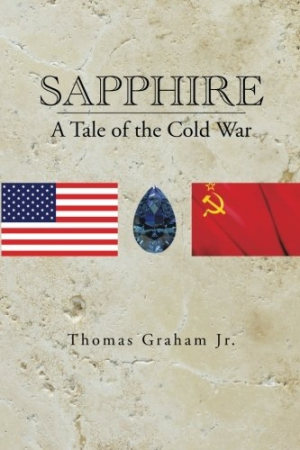Sapphire
A Tale of the Cold War
Graham has a lot of incredible material at his disposal in this refreshing historical thriller.
Introducing a refreshing change to a genre of espionage dominated by memorable male heroes, Thomas Graham Jr.‘s Sapphire is an enlightening piece of historical fiction. Set against the backdrop of the Cold War from 1954 to 1961, Graham’s insights are chilling. The tensile interactions between his heroine and the world’s political leaders reveal an extensive knowledge of post–World War II loyalties. The political chess game between the Soviets and Americans, involving players throughout Europe and the Middle East, is finely researched and very obviously the topic with which Graham is most confident.
Graham’s heroine, Linda, is a talented and headstrong spy for the Central Intelligence Agency. As she receives her first assignment and is sent to Moscow undercover as an art dealer, her worries are revealed through internal commentary. She questions who she can trust, why she is there, and if she can really go through with the life she has chosen. She is not the highly trained and confident government agent this genre is so full of.
Unlikely romance is introduced more than once throughout the course of the book. Whether an attempt to add dimension to the characters or to liven up the plot, it is often distracting. While dodging the KGB in an attempt to communicate a vital message from the US president to a sympathetic leader in Russia, Linda spends the night with a mysterious man and muses, “Do I really want to have a romantic relationship with a Russian general in the middle of all this? But then he is so handsome and sooo interesting.”
There are also some issues balancing the tension and timing of the story’s action. Entire chapters are spent developing backstories for characters who don’t need so much extensive introduction. Conversely, when Linda flees for her life from the KGB in the Middle East, the entire escape is over in a few sentences culminating with, “Suddenly there was a huge explosion, the boat literally disintegrated, and Linda and Joe were thrown off the end of the boat into the water.” There is a lot left up to the imagination where Graham could have created intensity and excitement.
Some incredibly coincidental plot twists, including a casual investment that ultimately creates a convenient cover for Linda, take away from the more interesting political interplay. It is almost as though the real story is hidden underneath one that is more “accessible” or more “Hollywood.”
The cover design and back cover copy indicate that this is a serious novel of espionage and split-hair decisions amid political chaos. The starkness of the US and Soviet flags facing off against a limestone backdrop communicates the hardness and resolve of each nation to stand strong for its beliefs.
With some more work, this novel could be truly excellent. Graham is a strong writer with in-depth knowledge of the nuanced political environment of the Cold War from his work as a US diplomat. His experience gives him a unique ability to diplomatically and sensitively illustrate tension between nations.
Reviewed by
Sara Budzik
Disclosure: This article is not an endorsement, but a review. The publisher of this book provided free copies of the book and paid a small fee to have their book reviewed by a professional reviewer. Foreword Reviews and Clarion Reviews make no guarantee that the publisher will receive a positive review. Foreword Magazine, Inc. is disclosing this in accordance with the Federal Trade Commission’s 16 CFR, Part 255.

